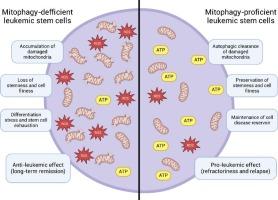自噬机制及其如何支持急性髓性白血病维持的最新展望。
IF 9.7
1区 医学
Q1 BIOCHEMISTRY & MOLECULAR BIOLOGY
Biochimica et biophysica acta. Reviews on cancer
Pub Date : 2024-11-01
DOI:10.1016/j.bbcan.2024.189214
引用次数: 0
摘要
造血干细胞逐渐获得遗传和表观遗传学干扰,赋予其恶性特征,使其成为新发急性髓性白血病(AML)的创始细胞和储库细胞,即白血病干细胞(LSC)。除了分子异质性外,急性髓细胞白血病还具有重构生物过程以支持其发病和维持的特点。据观察,白血病干细胞通过选择性自噬清除,固有地、主动地触发线粒体周转,因此损害这一过程会导致细胞分化,牺牲细胞的干性。本综述根据目前自噬过程的分子特征,对自噬调控机制进行了分析;将自噬描述为一种耐药机制,也是一种关键机制,LSC 可借此协调其对线粒体呼吸获取能量的强烈依赖和降低内部氧化应激以避免衰竭的必要性。因此,以自噬为靶点是促进急性髓细胞性白血病长期缓解的一种有前景的策略。本文章由计算机程序翻译,如有差异,请以英文原文为准。

An updated outlook on autophagy mechanism and how it supports acute myeloid leukemia maintenance
The gradual acquisition of genetic and epigenetic disturbances bestows malignant traits upon hematopoietic stem cells, subverting them into a founder and reservoir cell for de novo acute myeloid leukemia (AML) known as leukemic stem cells (LSC). Beyond its molecular heterogeneity, AML is also characterized by rewiring biological processes to support its onset and maintenance.
LSC were observed to inherently and actively trigger mitochondrial turnover through selective autophagic removal such that impairing the process led to cell differentiation at the expense of its stemness.
This review provides a current take on autophagy regulation mechanisms according to the current molecular characterization of the process; describes autophagy as a drug resistance mechanism, and a pivotal mechanism whereby LSC harmonize their strong reliance on mitochondrial respiration to obtain energy, and their necessity for lower internal oxidative stress to avoid exhaustion. Therefore, targeting autophagy presents a promising strategy to promote long-term remissions in AML.
求助全文
通过发布文献求助,成功后即可免费获取论文全文。
去求助
来源期刊

Biochimica et biophysica acta. Reviews on cancer
医学-生化与分子生物学
CiteScore
17.20
自引率
0.00%
发文量
138
审稿时长
33 days
期刊介绍:
Biochimica et Biophysica Acta (BBA) - Reviews on Cancer encompasses the entirety of cancer biology and biochemistry, emphasizing oncogenes and tumor suppressor genes, growth-related cell cycle control signaling, carcinogenesis mechanisms, cell transformation, immunologic control mechanisms, genetics of human (mammalian) cancer, control of cell proliferation, genetic and molecular control of organismic development, rational anti-tumor drug design. It publishes mini-reviews and full reviews.
 求助内容:
求助内容: 应助结果提醒方式:
应助结果提醒方式:


